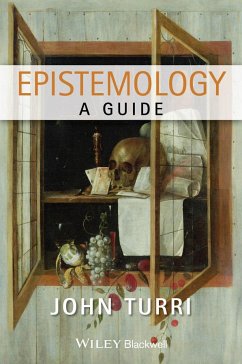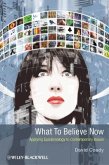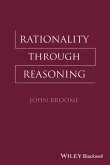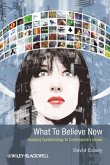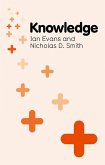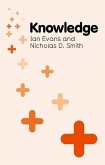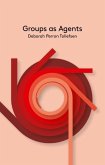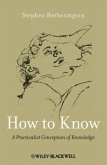- Gebundenes Buch
- Merkliste
- Auf die Merkliste
- Bewerten Bewerten
- Teilen
- Produkt teilen
- Produkterinnerung
- Produkterinnerung
Designed to accompany Epistemology: An Anthology or stand alone as a concise primer, this is a straightforward and accessible introduction to contemporary epistemology for those studying the topic for the first time.
A step-by-step introduction to contemporary epistemology, with coverage of skepticism, epistemic justification, epistemic closure, virtue epistemology, naturalized epistemology, and more Explains the main arguments of the most influential publications from the last 50 years Contextualizes key concepts and themes, instead of treating them in isolation Straightforward and…mehr
Andere Kunden interessierten sich auch für
![What to Believe Now: Applying Epistemology to Contemporary Issues What to Believe Now: Applying Epistemology to Contemporary Issues]() David CoadyWhat to Believe Now: Applying Epistemology to Contemporary Issues110,99 €
David CoadyWhat to Believe Now: Applying Epistemology to Contemporary Issues110,99 €![Rationality Through Reasoning Rationality Through Reasoning]() John BroomeRationality Through Reasoning46,99 €
John BroomeRationality Through Reasoning46,99 €![What to Believe Now What to Believe Now]() David CoadyWhat to Believe Now46,99 €
David CoadyWhat to Believe Now46,99 €![Knowledge Knowledge]() Ian EvansKnowledge25,99 €
Ian EvansKnowledge25,99 €![Knowledge Knowledge]() Ian EvansKnowledge69,99 €
Ian EvansKnowledge69,99 €![Groups as Agents Groups as Agents]() Deborah TollefsenGroups as Agents64,99 €
Deborah TollefsenGroups as Agents64,99 €![How to Know How to Know]() Stephen HetheringtonHow to Know50,99 €
Stephen HetheringtonHow to Know50,99 €-
-
-
Designed to accompany Epistemology: An Anthology or stand alone as a concise primer, this is a straightforward and accessible introduction to contemporary epistemology for those studying the topic for the first time.
A step-by-step introduction to contemporary epistemology, with coverage of skepticism, epistemic justification, epistemic closure, virtue epistemology, naturalized epistemology, and more
Explains the main arguments of the most influential publications from the last 50 years
Contextualizes key concepts and themes, instead of treating them in isolation
Straightforward and accessible for those studying the topic for the first time
Designed to accompany the second edition of Epistemology: An Anthology (Wiley Blackwell, 2008), but stands on its own as a concise introduction to the key ideas and arguments in epistemology
A step-by-step introduction to contemporary epistemology, with coverage of skepticism, epistemic justification, epistemic closure, virtue epistemology, naturalized epistemology, and more
Explains the main arguments of the most influential publications from the last 50 years
Contextualizes key concepts and themes, instead of treating them in isolation
Straightforward and accessible for those studying the topic for the first time
Designed to accompany the second edition of Epistemology: An Anthology (Wiley Blackwell, 2008), but stands on its own as a concise introduction to the key ideas and arguments in epistemology
Produktdetails
- Produktdetails
- Verlag: Wiley & Sons
- 1. Auflage
- Seitenzahl: 322
- Erscheinungstermin: 14. Oktober 2013
- Englisch
- Abmessung: 231mm x 155mm x 20mm
- Gewicht: 562g
- ISBN-13: 9781444333695
- ISBN-10: 1444333690
- Artikelnr.: 39764873
- Verlag: Wiley & Sons
- 1. Auflage
- Seitenzahl: 322
- Erscheinungstermin: 14. Oktober 2013
- Englisch
- Abmessung: 231mm x 155mm x 20mm
- Gewicht: 562g
- ISBN-13: 9781444333695
- ISBN-10: 1444333690
- Artikelnr.: 39764873
John Turri is Assistant Professor of Philosophy at the University of Waterloo, Canada. He specializes in epistemology, philosophy of language, experimental philosophy, and cognitive science. He is editor of Virtuous Thoughts: The Philosophy of Ernest Sosa (2013) and co-editor of Contemporary Debates in Epistemology (2nd edition, Wiley, 2013) and Virtue Epistemology: Contemporary Readings (2012).
Preface xi Acknowledgments xiii 1 The best case for skepticism about the external world? (Stroud
"The Problem of the External World") 1 2 Proving the external world exists (Or: Let's all give Moore a hand!) (Moore
"Proof of an External World") 6 3 Some ways of resisting skepticism (Moore
"Four Forms of Scepticism") 10 4 Plausibility and possibilities (Moore
"Certainty") 15 5 Skeptic on skeptic (Klein
"How a Pyrrhonian Skeptic Might Respond to Academic Skepticism") 19 6 Realism in epistemology (Williams
"Epistemological Realism") 24 7 Socratic questions and the foundation of empirical knowledge (Chisholm
"The Myth of the Given") 31 8-9 The foundation of empirical knowledge? (Sellars
"Does Empirical Knowledge Have a Foundation?" and "Epistemic Principles") 36 10 It's not a given that empirical knowledge has a foundation (BonJour
"Can Empirical Knowledge Have a Foundation?") 44 11 Interpretation
meaning and skepticism (Davidson
"A Coherence Theory of Truth and Knowledge") 49 12 Blending foundationalism and coherentism (Haack
"A Foundherentist Theory of Epistemic Justification") 54 13 Foundationalism
coherentism and supervenience (Sosa
"The Raft and the Pyramid") 60 14 Infinitism (Klein
"Human Knowledge and the Infinite Regress of Reasons") 67 15 The Gettier problem (Gettier
"Is Justified True Belief Knowledge?") 73 16 Some principles concerning knowledge and inference (Harman
Thought
Selections) 77 17 The essence of the Gettier problem (Zagzebski
"The Inescapability of Gettier Problems") 83 18 Knowledge is an unanalyzable mental state (Williamson
"A State of Mind") 85 19 Closure
contrast and semi-skepticism (Dretske
"Epistemic Operators") 92 20 Closure
contrast and anti-skepticism (Stine
"Skepticism
Relevant Alternatives
and Deductive Closure") 99 21 Keeping close track of knowledge (Nozick
"Knowledge and Skepticism") 103 22 Moore wins (Sosa
"How to Defeat Opposition to Moore") 111 23 The closure principle: dangers and defense (Vogel
"Are There Counter examples to the Closure Principle?") 116 24 Evidentialist epistemology (Feldman and Conee
"Evidentialism") 123 25 Non-defensive epistemology (Foley
"Skepticism and Rationality") 129 26 Reliabilism about justification (Goldman
"What Is Justified Belief?") 135 27 Reliabilism: a level assessment (Vogel
"Reliabilism Leveled") 141 28 Against externalism (BonJour
"Externalist Theories of Empirical Knowledge") 146 29 Against internalism (Goldman
"Internalism Exposed") 151 30 A skeptical take on externalism (Fumerton
"Externalism and Skepticism") 156 31 A friendly take on internalism (Feldman and Conee
"Internalism Defended") 159 32 Warrant (Plantinga
"Warrant: A First Approximation") 164 33 Intellectual virtues (Zagzebski
Virtues of the Mind) 169 34 Virtue epistemology (Greco
"Virtues and Vices of Virtue Epistemology") 172 35 Knowledge
luck and virtue (Pritchard
"Cognitive Responsibility and the Epistemic Virtues") 176 36 Epistemic value and cognitive achievement (Sosa
"The Place of Truth in Epistemology") 181 37 Giving up on knowledge (Kvanvig
"Why Should Inquiring Minds Want to Know?") 187 38 Giving up on (exact) truth (Elgin
"True Enough") 192 39 Naturalized epistemology advertised (Quine
"Epistemology Naturalized") 196 40 Naturalized epistemology criticized (Kim
"What is 'Naturalized Epistemology'?") 203 41 Naturalized epistemology radicalized (Antony
"Quine as Feminist") 207 42 A apriori justification and unrevisability (Putnam
"There is at Least One A Priori Truth") 211 43 A priori justification and revisability (Casullo
"Revisability
Reliabilism
and A Priori Knowledge") 215 44 Philosophical method and empirical science (Bealer
"A Priori Knowledge and the Scope of Philosophy") 219 45 Experimental epistemology (Weinberg
Nichols and Stich
"Normativity and Epistemic Intuitions") 226 46 Natural kinds
intuitions and method in epistemology (Kornblith
"Investigating Knowledge Itself") 230 47 Contextualism and skeptical puzzles (DeRose
"Solving the Skeptical Problem") 235 48 Contextualism and infallibilist intuitions (Lewis
"Elusive Knowledge") 240 49 Contextualism and intuitional instability (Cohen
"Contextualist Solutions to Epistemological Problems") 244 50 Knowledge and action (Stanley
"Knowledge and Practical Interests
Selections") 247 51 Rationality and action (Fantl and McGrath
"Evidence
Pragmatics
and Justification") 252 52 One invariantist's scorecard (Hawthorne
"Sensitive Moderate Invariantism") 258 53 A relativist theory of knowledge attributions (MacFarlane
"The Assessment Sensitivity of Knowledge Attributions") 264 54 Rationality and trust (Baker
"Trust and Rationality") 270 55 Testimony and gullibility (Fricker
"Against Gullibility") 273 56 Some reflections on how epistemic sources work (Burge
"Content Preservation") 277 57 Testimony and knowledge (Lackey
"Testimonial Knowledge and Transmission") 282 58 Memory and knowledge (Huemer
"The Problem of Memory Knowledge") 286 59 Perception and knowledge (McDowell
"Criteria
Defeasibility
and Knowledge") 291 60 Skills and knowledge (Reynolds
"Knowing How to Believe with Justification") 295 Index 299
"The Problem of the External World") 1 2 Proving the external world exists (Or: Let's all give Moore a hand!) (Moore
"Proof of an External World") 6 3 Some ways of resisting skepticism (Moore
"Four Forms of Scepticism") 10 4 Plausibility and possibilities (Moore
"Certainty") 15 5 Skeptic on skeptic (Klein
"How a Pyrrhonian Skeptic Might Respond to Academic Skepticism") 19 6 Realism in epistemology (Williams
"Epistemological Realism") 24 7 Socratic questions and the foundation of empirical knowledge (Chisholm
"The Myth of the Given") 31 8-9 The foundation of empirical knowledge? (Sellars
"Does Empirical Knowledge Have a Foundation?" and "Epistemic Principles") 36 10 It's not a given that empirical knowledge has a foundation (BonJour
"Can Empirical Knowledge Have a Foundation?") 44 11 Interpretation
meaning and skepticism (Davidson
"A Coherence Theory of Truth and Knowledge") 49 12 Blending foundationalism and coherentism (Haack
"A Foundherentist Theory of Epistemic Justification") 54 13 Foundationalism
coherentism and supervenience (Sosa
"The Raft and the Pyramid") 60 14 Infinitism (Klein
"Human Knowledge and the Infinite Regress of Reasons") 67 15 The Gettier problem (Gettier
"Is Justified True Belief Knowledge?") 73 16 Some principles concerning knowledge and inference (Harman
Thought
Selections) 77 17 The essence of the Gettier problem (Zagzebski
"The Inescapability of Gettier Problems") 83 18 Knowledge is an unanalyzable mental state (Williamson
"A State of Mind") 85 19 Closure
contrast and semi-skepticism (Dretske
"Epistemic Operators") 92 20 Closure
contrast and anti-skepticism (Stine
"Skepticism
Relevant Alternatives
and Deductive Closure") 99 21 Keeping close track of knowledge (Nozick
"Knowledge and Skepticism") 103 22 Moore wins (Sosa
"How to Defeat Opposition to Moore") 111 23 The closure principle: dangers and defense (Vogel
"Are There Counter examples to the Closure Principle?") 116 24 Evidentialist epistemology (Feldman and Conee
"Evidentialism") 123 25 Non-defensive epistemology (Foley
"Skepticism and Rationality") 129 26 Reliabilism about justification (Goldman
"What Is Justified Belief?") 135 27 Reliabilism: a level assessment (Vogel
"Reliabilism Leveled") 141 28 Against externalism (BonJour
"Externalist Theories of Empirical Knowledge") 146 29 Against internalism (Goldman
"Internalism Exposed") 151 30 A skeptical take on externalism (Fumerton
"Externalism and Skepticism") 156 31 A friendly take on internalism (Feldman and Conee
"Internalism Defended") 159 32 Warrant (Plantinga
"Warrant: A First Approximation") 164 33 Intellectual virtues (Zagzebski
Virtues of the Mind) 169 34 Virtue epistemology (Greco
"Virtues and Vices of Virtue Epistemology") 172 35 Knowledge
luck and virtue (Pritchard
"Cognitive Responsibility and the Epistemic Virtues") 176 36 Epistemic value and cognitive achievement (Sosa
"The Place of Truth in Epistemology") 181 37 Giving up on knowledge (Kvanvig
"Why Should Inquiring Minds Want to Know?") 187 38 Giving up on (exact) truth (Elgin
"True Enough") 192 39 Naturalized epistemology advertised (Quine
"Epistemology Naturalized") 196 40 Naturalized epistemology criticized (Kim
"What is 'Naturalized Epistemology'?") 203 41 Naturalized epistemology radicalized (Antony
"Quine as Feminist") 207 42 A apriori justification and unrevisability (Putnam
"There is at Least One A Priori Truth") 211 43 A priori justification and revisability (Casullo
"Revisability
Reliabilism
and A Priori Knowledge") 215 44 Philosophical method and empirical science (Bealer
"A Priori Knowledge and the Scope of Philosophy") 219 45 Experimental epistemology (Weinberg
Nichols and Stich
"Normativity and Epistemic Intuitions") 226 46 Natural kinds
intuitions and method in epistemology (Kornblith
"Investigating Knowledge Itself") 230 47 Contextualism and skeptical puzzles (DeRose
"Solving the Skeptical Problem") 235 48 Contextualism and infallibilist intuitions (Lewis
"Elusive Knowledge") 240 49 Contextualism and intuitional instability (Cohen
"Contextualist Solutions to Epistemological Problems") 244 50 Knowledge and action (Stanley
"Knowledge and Practical Interests
Selections") 247 51 Rationality and action (Fantl and McGrath
"Evidence
Pragmatics
and Justification") 252 52 One invariantist's scorecard (Hawthorne
"Sensitive Moderate Invariantism") 258 53 A relativist theory of knowledge attributions (MacFarlane
"The Assessment Sensitivity of Knowledge Attributions") 264 54 Rationality and trust (Baker
"Trust and Rationality") 270 55 Testimony and gullibility (Fricker
"Against Gullibility") 273 56 Some reflections on how epistemic sources work (Burge
"Content Preservation") 277 57 Testimony and knowledge (Lackey
"Testimonial Knowledge and Transmission") 282 58 Memory and knowledge (Huemer
"The Problem of Memory Knowledge") 286 59 Perception and knowledge (McDowell
"Criteria
Defeasibility
and Knowledge") 291 60 Skills and knowledge (Reynolds
"Knowing How to Believe with Justification") 295 Index 299
Preface xi Acknowledgments xiii 1 The best case for skepticism about the external world? (Stroud
"The Problem of the External World") 1 2 Proving the external world exists (Or: Let's all give Moore a hand!) (Moore
"Proof of an External World") 6 3 Some ways of resisting skepticism (Moore
"Four Forms of Scepticism") 10 4 Plausibility and possibilities (Moore
"Certainty") 15 5 Skeptic on skeptic (Klein
"How a Pyrrhonian Skeptic Might Respond to Academic Skepticism") 19 6 Realism in epistemology (Williams
"Epistemological Realism") 24 7 Socratic questions and the foundation of empirical knowledge (Chisholm
"The Myth of the Given") 31 8-9 The foundation of empirical knowledge? (Sellars
"Does Empirical Knowledge Have a Foundation?" and "Epistemic Principles") 36 10 It's not a given that empirical knowledge has a foundation (BonJour
"Can Empirical Knowledge Have a Foundation?") 44 11 Interpretation
meaning and skepticism (Davidson
"A Coherence Theory of Truth and Knowledge") 49 12 Blending foundationalism and coherentism (Haack
"A Foundherentist Theory of Epistemic Justification") 54 13 Foundationalism
coherentism and supervenience (Sosa
"The Raft and the Pyramid") 60 14 Infinitism (Klein
"Human Knowledge and the Infinite Regress of Reasons") 67 15 The Gettier problem (Gettier
"Is Justified True Belief Knowledge?") 73 16 Some principles concerning knowledge and inference (Harman
Thought
Selections) 77 17 The essence of the Gettier problem (Zagzebski
"The Inescapability of Gettier Problems") 83 18 Knowledge is an unanalyzable mental state (Williamson
"A State of Mind") 85 19 Closure
contrast and semi-skepticism (Dretske
"Epistemic Operators") 92 20 Closure
contrast and anti-skepticism (Stine
"Skepticism
Relevant Alternatives
and Deductive Closure") 99 21 Keeping close track of knowledge (Nozick
"Knowledge and Skepticism") 103 22 Moore wins (Sosa
"How to Defeat Opposition to Moore") 111 23 The closure principle: dangers and defense (Vogel
"Are There Counter examples to the Closure Principle?") 116 24 Evidentialist epistemology (Feldman and Conee
"Evidentialism") 123 25 Non-defensive epistemology (Foley
"Skepticism and Rationality") 129 26 Reliabilism about justification (Goldman
"What Is Justified Belief?") 135 27 Reliabilism: a level assessment (Vogel
"Reliabilism Leveled") 141 28 Against externalism (BonJour
"Externalist Theories of Empirical Knowledge") 146 29 Against internalism (Goldman
"Internalism Exposed") 151 30 A skeptical take on externalism (Fumerton
"Externalism and Skepticism") 156 31 A friendly take on internalism (Feldman and Conee
"Internalism Defended") 159 32 Warrant (Plantinga
"Warrant: A First Approximation") 164 33 Intellectual virtues (Zagzebski
Virtues of the Mind) 169 34 Virtue epistemology (Greco
"Virtues and Vices of Virtue Epistemology") 172 35 Knowledge
luck and virtue (Pritchard
"Cognitive Responsibility and the Epistemic Virtues") 176 36 Epistemic value and cognitive achievement (Sosa
"The Place of Truth in Epistemology") 181 37 Giving up on knowledge (Kvanvig
"Why Should Inquiring Minds Want to Know?") 187 38 Giving up on (exact) truth (Elgin
"True Enough") 192 39 Naturalized epistemology advertised (Quine
"Epistemology Naturalized") 196 40 Naturalized epistemology criticized (Kim
"What is 'Naturalized Epistemology'?") 203 41 Naturalized epistemology radicalized (Antony
"Quine as Feminist") 207 42 A apriori justification and unrevisability (Putnam
"There is at Least One A Priori Truth") 211 43 A priori justification and revisability (Casullo
"Revisability
Reliabilism
and A Priori Knowledge") 215 44 Philosophical method and empirical science (Bealer
"A Priori Knowledge and the Scope of Philosophy") 219 45 Experimental epistemology (Weinberg
Nichols and Stich
"Normativity and Epistemic Intuitions") 226 46 Natural kinds
intuitions and method in epistemology (Kornblith
"Investigating Knowledge Itself") 230 47 Contextualism and skeptical puzzles (DeRose
"Solving the Skeptical Problem") 235 48 Contextualism and infallibilist intuitions (Lewis
"Elusive Knowledge") 240 49 Contextualism and intuitional instability (Cohen
"Contextualist Solutions to Epistemological Problems") 244 50 Knowledge and action (Stanley
"Knowledge and Practical Interests
Selections") 247 51 Rationality and action (Fantl and McGrath
"Evidence
Pragmatics
and Justification") 252 52 One invariantist's scorecard (Hawthorne
"Sensitive Moderate Invariantism") 258 53 A relativist theory of knowledge attributions (MacFarlane
"The Assessment Sensitivity of Knowledge Attributions") 264 54 Rationality and trust (Baker
"Trust and Rationality") 270 55 Testimony and gullibility (Fricker
"Against Gullibility") 273 56 Some reflections on how epistemic sources work (Burge
"Content Preservation") 277 57 Testimony and knowledge (Lackey
"Testimonial Knowledge and Transmission") 282 58 Memory and knowledge (Huemer
"The Problem of Memory Knowledge") 286 59 Perception and knowledge (McDowell
"Criteria
Defeasibility
and Knowledge") 291 60 Skills and knowledge (Reynolds
"Knowing How to Believe with Justification") 295 Index 299
"The Problem of the External World") 1 2 Proving the external world exists (Or: Let's all give Moore a hand!) (Moore
"Proof of an External World") 6 3 Some ways of resisting skepticism (Moore
"Four Forms of Scepticism") 10 4 Plausibility and possibilities (Moore
"Certainty") 15 5 Skeptic on skeptic (Klein
"How a Pyrrhonian Skeptic Might Respond to Academic Skepticism") 19 6 Realism in epistemology (Williams
"Epistemological Realism") 24 7 Socratic questions and the foundation of empirical knowledge (Chisholm
"The Myth of the Given") 31 8-9 The foundation of empirical knowledge? (Sellars
"Does Empirical Knowledge Have a Foundation?" and "Epistemic Principles") 36 10 It's not a given that empirical knowledge has a foundation (BonJour
"Can Empirical Knowledge Have a Foundation?") 44 11 Interpretation
meaning and skepticism (Davidson
"A Coherence Theory of Truth and Knowledge") 49 12 Blending foundationalism and coherentism (Haack
"A Foundherentist Theory of Epistemic Justification") 54 13 Foundationalism
coherentism and supervenience (Sosa
"The Raft and the Pyramid") 60 14 Infinitism (Klein
"Human Knowledge and the Infinite Regress of Reasons") 67 15 The Gettier problem (Gettier
"Is Justified True Belief Knowledge?") 73 16 Some principles concerning knowledge and inference (Harman
Thought
Selections) 77 17 The essence of the Gettier problem (Zagzebski
"The Inescapability of Gettier Problems") 83 18 Knowledge is an unanalyzable mental state (Williamson
"A State of Mind") 85 19 Closure
contrast and semi-skepticism (Dretske
"Epistemic Operators") 92 20 Closure
contrast and anti-skepticism (Stine
"Skepticism
Relevant Alternatives
and Deductive Closure") 99 21 Keeping close track of knowledge (Nozick
"Knowledge and Skepticism") 103 22 Moore wins (Sosa
"How to Defeat Opposition to Moore") 111 23 The closure principle: dangers and defense (Vogel
"Are There Counter examples to the Closure Principle?") 116 24 Evidentialist epistemology (Feldman and Conee
"Evidentialism") 123 25 Non-defensive epistemology (Foley
"Skepticism and Rationality") 129 26 Reliabilism about justification (Goldman
"What Is Justified Belief?") 135 27 Reliabilism: a level assessment (Vogel
"Reliabilism Leveled") 141 28 Against externalism (BonJour
"Externalist Theories of Empirical Knowledge") 146 29 Against internalism (Goldman
"Internalism Exposed") 151 30 A skeptical take on externalism (Fumerton
"Externalism and Skepticism") 156 31 A friendly take on internalism (Feldman and Conee
"Internalism Defended") 159 32 Warrant (Plantinga
"Warrant: A First Approximation") 164 33 Intellectual virtues (Zagzebski
Virtues of the Mind) 169 34 Virtue epistemology (Greco
"Virtues and Vices of Virtue Epistemology") 172 35 Knowledge
luck and virtue (Pritchard
"Cognitive Responsibility and the Epistemic Virtues") 176 36 Epistemic value and cognitive achievement (Sosa
"The Place of Truth in Epistemology") 181 37 Giving up on knowledge (Kvanvig
"Why Should Inquiring Minds Want to Know?") 187 38 Giving up on (exact) truth (Elgin
"True Enough") 192 39 Naturalized epistemology advertised (Quine
"Epistemology Naturalized") 196 40 Naturalized epistemology criticized (Kim
"What is 'Naturalized Epistemology'?") 203 41 Naturalized epistemology radicalized (Antony
"Quine as Feminist") 207 42 A apriori justification and unrevisability (Putnam
"There is at Least One A Priori Truth") 211 43 A priori justification and revisability (Casullo
"Revisability
Reliabilism
and A Priori Knowledge") 215 44 Philosophical method and empirical science (Bealer
"A Priori Knowledge and the Scope of Philosophy") 219 45 Experimental epistemology (Weinberg
Nichols and Stich
"Normativity and Epistemic Intuitions") 226 46 Natural kinds
intuitions and method in epistemology (Kornblith
"Investigating Knowledge Itself") 230 47 Contextualism and skeptical puzzles (DeRose
"Solving the Skeptical Problem") 235 48 Contextualism and infallibilist intuitions (Lewis
"Elusive Knowledge") 240 49 Contextualism and intuitional instability (Cohen
"Contextualist Solutions to Epistemological Problems") 244 50 Knowledge and action (Stanley
"Knowledge and Practical Interests
Selections") 247 51 Rationality and action (Fantl and McGrath
"Evidence
Pragmatics
and Justification") 252 52 One invariantist's scorecard (Hawthorne
"Sensitive Moderate Invariantism") 258 53 A relativist theory of knowledge attributions (MacFarlane
"The Assessment Sensitivity of Knowledge Attributions") 264 54 Rationality and trust (Baker
"Trust and Rationality") 270 55 Testimony and gullibility (Fricker
"Against Gullibility") 273 56 Some reflections on how epistemic sources work (Burge
"Content Preservation") 277 57 Testimony and knowledge (Lackey
"Testimonial Knowledge and Transmission") 282 58 Memory and knowledge (Huemer
"The Problem of Memory Knowledge") 286 59 Perception and knowledge (McDowell
"Criteria
Defeasibility
and Knowledge") 291 60 Skills and knowledge (Reynolds
"Knowing How to Believe with Justification") 295 Index 299

